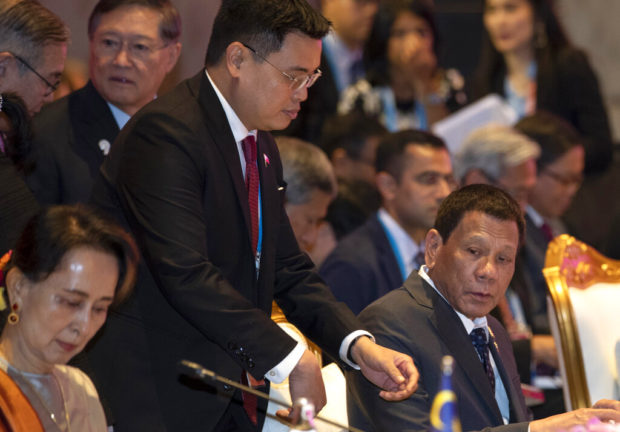15 Asia-Pacific countries agree on trade pact

NONTHABURI, Thailand — Fifteen Asia-Pacific countries, including the Philippines, are moving forward with what could be one of the world’s biggest trade deals, their leaders said in a statement at the close of a regional summit here on Monday.
The Regional Comprehensive Economic Partnership (RCEP) is backed by China and also brings in the 10-member Association of Southeast Asian Nations (Asean), Japan, South Korea, Australia and New Zealand.
Participating countries concluded their text-based negotiations on RCEP in a meeting held alongside a summit of the Asean leaders here. The agreement came after seven years of talks.
India delayed its decision on joining because of significant differences over tariffs and other issues.
The RCEP leaders, however, left open the door for India to still join if it can resolve issues before the deal is set to be signed next year.
Negotiations concluded
“We noted 15 RCEP participating countries have concluded text-based negotiations for all 20 chapters and essentially all their market access issues,” the statement from the leaders said.
“India has significant outstanding issues, which remain unresolved… India’s final decision will depend on satisfactory resolution of these issues,” it said.
India has been a sticking point in the RCEP talks, after it has raised fears of opening its market to competition.
In particular, it has expressed concern that the deal would open a flood of cheap Chinese goods and agricultural produce from Australia and New Zealand that would harm local producers.
Philippine Trade Secretary Ramon Lopez said at an earlier press briefing that the mindset remained to be that all 16 countries would be included in the deal.
After legal scrubbing, signing is expected by next year in Vietnam, which now holds the rotating Asean chairmanship after Thailand handed it over at the close of the regional summit on Monday.
3.5-billion-people market
Under the deal, Asean’s current 600-million-people market will be opened to a whopping 3.5-billion-people market, where goods and services would be more openly traded among participating countries.
The deal covers nearly half of the world’s population and a third of the world’s economy and also of global trade.
During the Asean-India summit on Sunday, the Philippines’ President Rodrigo Duterte urged India to join the RCEP in order to “narrow [the] development gap.”
The President, however, cut short his participation in the Asean summit and skipped both the meeting’s closing ceremony and the RCEP summit on Monday night.
He reportedly flew back to the Philippines right after the Asean-Japan summit, which was held late in the afternoon.
As of press time on Monday night, however, Malacañang had yet to confirm the President’s early departure.
Lopez represented the President at the RCEP summit, while Foreign Secretary Teodoro Locsin Jr. stood for him during the closing ceremonies.
The trade war between the United States and China has given new impetus to years of discussion on the Asian trade bloc.
US President Donald Trump skipped this year Asean summit, sending instead his national security adviser, Robert O’Brien, as his special envoy. —With a report from the wires